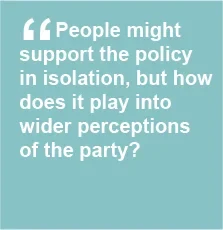When a popular policy fails to boost its owner
Our voting intention figures for the Sun so far this week have shown Labour leads of two and three points, down from the six point lead that we have been averaging at since mid-2010. All polls have a margin of error so it's still possible this is just co-incidence, but it does look as if Labour's lead is softening. This apparent drop in Labour's lead seems to have come about at the same time that Labour have begun to but the flesh on the bones of their economic policies for the next election, promising to limit spending and to re-introduce the 50p top rate of tax.
The 50p rate of taxation is a good example of how the public's reaction to policies can be a bit more complicated than a single polling question suggests. At one level it is a very popular policy. Our polling for the Times found that 61% of people supported it, with only 26% of people opposed. However, at the same time as it was launched Labour's lead has decreased. How does one square this apparent contradiction?

One possibility is the way policies play into wider perceptions of the parties. People might support the policy in isolation, but how does it play into wider perceptions of party? What sort of mood music does it create around an political party? Does it reinforce existing negative perceptions? Considerations like this are, for example, why immigration can be such a difficult issue for political parties to handle: while the public are broadly anti-immigration and say they would like to see tougher immigration policies, if a political party goes down that route they must be careful not to end up looking intolerant or bigoted.
Labour's recent actions could have risked doing the same Labour as an anti-business party, a party that people don't trust to deal with the economy. Our Sunday Times polling at the weekend found that 45% thought it would be bad for the economy if Labour won power on the back of policies that large British businesses were unhappy with, and our polling for the Sun this week has found that Ed Miliband & Ed Balls are trusted the most to run the economy by just 24% of people, behind Cameron and Osborne on 39%. This is the lowest the two Eds have polled on this question since we began asking in 2011, and a drop of five points since earlier this month.
An alternative explanation is simply that individual polices rarely make much difference at all. Most people don't pay much attention to them or view them through the prism of their existing political support. It could be that the apparent narrowing in Labour's lead has nothing to do with Labour's 50p announcements at all. One possible alternate explanation is the good news on unemployment and the general increase in economic confidence. Our weekly question on people's confidence in their household finances in the year ahead rose to minus 19 last week - still negative, but the highest since 2010. The proportion of people thinking the government was handling the economy well rose to 44%, also the best figures for four years.
In the event that the last couple of days' polls do turn out to be a narrowing of Labour's lead and not just random noise, it may well be as much the drip-drip of economic news as the party political headlines.
Image: Getty







